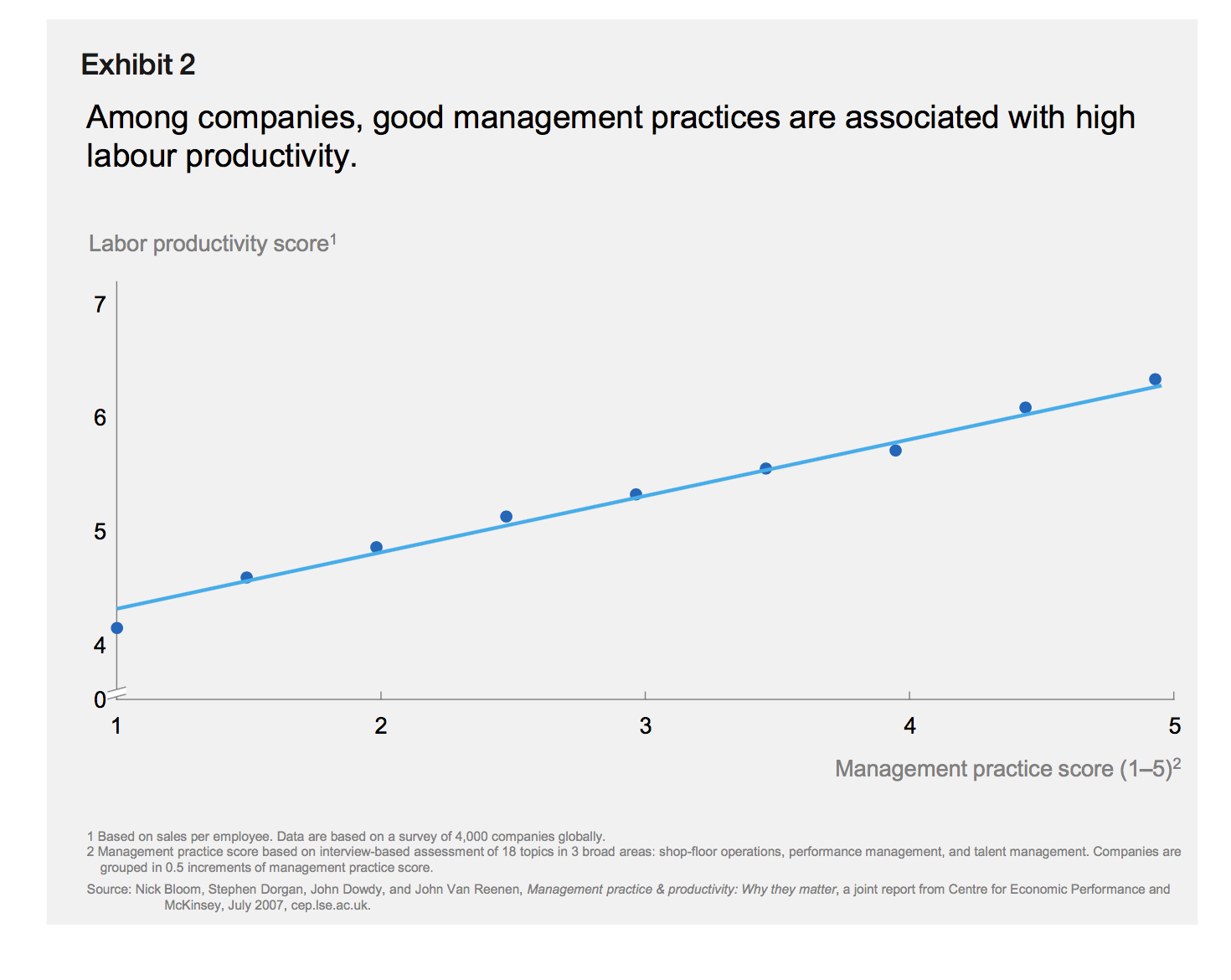Synthesis from McKinsey & Company Discussion Paper
Read in this link the first part
UK, January 18, 2017.-The Productivity Leadership Group’s research identifies six areas in which companies can make productivity-enhancing improvements: digitisation, commercial excellence, talent management, planning for the future, leadership, and operational efficiency. Policy makers can play a part in encouraging better management by having a strong competition and consumer-protection regime, encouraging companies to export, reducing restrictions on imports, promoting the adoption of digital and other new technologies, and supporting training programmes for workers.
Increase female participation in the economy.
If women participated in the British economy as much as men, it could add £600 billion to GDP in 2025. More realistically, if each region were to add women to the workforce at the fastest pace it achieved during the past decade, then the United Kingdom would add £150 billion to its GDP in 2025.12 This is equivalent to 0.7 percent additional GDP growth per year for the next ten years. While every region in the United Kingdom could make gains in this respect, the largest opportunities are in London and in northwestern and southeastern England.13 Realising those opportunities would require looking at policies such as flexible working schemes, child care, and “returnships” to help women return to work after time away.
Boost public-sector productivity.
Since 1997, public-sector productivity growth (as measured by the Office for National Statistics) has been flat, falling behind the rest of the economy.14 A 10 percent productivity improvement across government could yield £50 billion per year. Money could be better spent through more rigorous, evidence-based prioritisation of policy and funding, and more strategic management of the government’s balance sheet, including property and asset disposals. Government departments could improve efficiency by promoting a more flexible workforce, both within and across departments. When it comes to functional capabilities, the public sector should develop private sector–style procurement and supply- chain expertise, strengthen the management of capital projects, and invest in big data and advanced analytics to streamline operations and inform decisions.
Increase the stock of affordable housing.
The lack of affordable housing is a global problem, but it is particularly acute in the United Kingdom. The McKinsey Global Institute has identified four approaches that can help tackle it: unlocking land supply, reducing construction costs, improving operations and maintenance, and lowering finance costs.16 All these approaches can be applied in the United Kingdom. London First, a not-for-profit group that includes many leading businesses and universities, researches long-term issues related to London and has identified housing and effective transport as critical factors for the city to continue to attract the talent it needs to stay competitive and dynamic. The challenge is pressing. Creation of new homes has decreased steadily (to 156,000 in 2015 from 360,000 a year in 1970), while average real house prices in England and Wales have doubled since 2002. Increasing the housing supply and reducing the cost of housing could help increase productivity by enhancing labour-market flexibility, reducing mortgage spending, and redirecting domestic and foreign investment to more productive activities.

Making Brexit work for business: Six areas of focus
Although UK companies may feel a financial impact from Brexit, it could also create opportunities. We have identified six areas of focus for UK companies:
1) Prepare for an intense war for talent. Most analysts believe Brexit will be followed with restrictions on migration. This perception is already prompting changes in the attitudes of potential new hires. Companies must refine their hiring practices and answer recruits’ concerns, including the pound sterling’s depreciation.
2) Improve workforce productivity to mitigate upward wage pressures. After Brexit, a reduction in immigration is likely to make labour more expensive. To counter this, companies should streamline their operations and deploy talent carefully. Companies can gauge their productivity and look for improvements using the “How Good Is Your Business Really” tool, developed by the Sir Charlie Mayfield productivity movement.1
3) Improve competitiveness to counteract the impact of trade barriers. Potential tariffs and non-tariff barriers with EU trading partners will increase costs and transit times. Trade barriers may also protect some domestic companies from foreign competition, which may drive up prices and lower the quality of goods and services available. Businesses need to become more competitive by lowering costs and pursuing innovations, and use the current depreciation of the pound sterling as an opportunity to take action.
4) Re-orient international trading strategies to the world beyond Europe and re-assess strategies for trading with the European Union. Brexit makes it important for UK companies to deepen their trading relationships outside the European Union while managing the increased costs of trading with partners in the European Union. Businesses can adjust by shifting their imports (including supply chains) and exports toward emerging and developed markets other than Europe.
5) Play a part in shaping the future. The political and regulatory decisions that are made over the next few years will shape the future for a long time to come. Businesses should decide what positions to take on matters affecting their industry, and how to express them. For example, is it favourable for a company if UK regulations match EU regulations or if UK regulations are less stringent?
6) Assess immediate opportunities to invest in the UK. The current pound sterling depreciation may create opportunities for businesses with balance sheets outside of the United Kingdom to invest in the country. This could be through increasing existing investments, looking for new ones, or deepening collaboration with British organisations.







